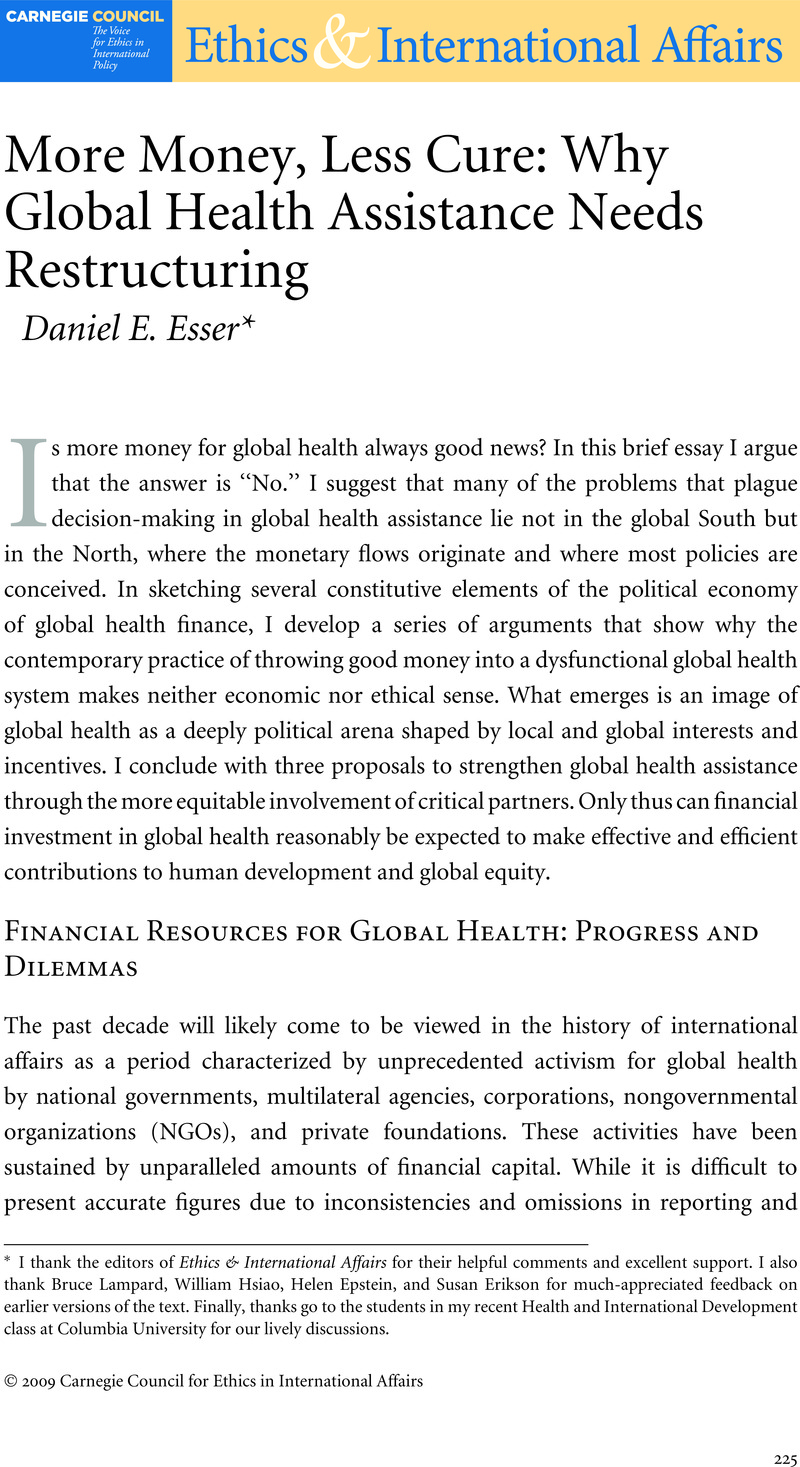Article contents
More Money, Less Cure: Why Global Health Assistance Needs Restructuring
Published online by Cambridge University Press: 25 March 2011
Abstract

- Type
- Essays
- Information
- Copyright
- Copyright © Carnegie Council for Ethics in International Affairs 2009
References
Notes
1 MacKellar, Landis, “Priorities in Global Assistance for Health, AIDS, and Population,” Population and Development Review 31 no. 2 (2005), pp. 293–312.CrossRefGoogle Scholar
2 Canning, David, “Priority Setting and the ‘Neglected’ Tropical Diseases,” Transactions of the Royal Society of Tropical Medicine and Hygiene 100, (June 2006), pp. 499–504.CrossRefGoogle Scholar
3 Esser, Daniel E. andBench, Kara Keating, “Funding Foci, Effectiveness Proxies and Recipients' Priorities for Global Health Assistance: Are U.S. Foundations More Responsive Than Official Development Assistance?” World Development(forthcoming).Google Scholar
4 Walt, Gill, Health Policy: An Introduction to Process and Power (London: Zed Books, 1994).Google Scholar
5 Murray, Christopher J. L. et al. , “Effectiveness and Costs of Interventions to Lower Systolic Blood Pressure and Cholesterol: A Global and Regional Analysis on Reduction of Cardiovascular-Disease Risk,” Lancet 361, (March 2003), pp. 717–25; Powell-Jackson, Timothy et al. , ““Countdown to 2015: Tracking Donor Assistance to Maternal, Newborn, and Child Health,” Lancet 368, (September 2006), pp. 1077–87; and Parkhurst, Justin, “The Crisis of AIDS and the Politics of Response: The Case of Uganda,” International Relations 15 no. 6 (2001)pp. 69–87.CrossRefGoogle Scholar
6 Gostin, Lawrence, “Why Rich Countries Should Care About the World's Least Healthy People,” Journal of the American Medical Association 298 no. 1 (2007), pp. 89–92.CrossRefGoogle Scholar
7 Congressional Budget Office, “A Potential Influenza Pandemic: Possible Macroeconomic Effects and Policy Issues” (December 8, 2005; revised July 27, 2006);available at http:\\www.cbo.gov/ftpdocs/69xx/doc6946/12-08-BirdFlu.pdf(accessed June 23, 2009).Google Scholar
8 Epstein, Helen, The Invisible Cure: Why We Are Losing the Fight Against AIDS in Africa (New York: Picador, 2007).Google Scholar
9 “The Price of Good Deeds,” Economist, February 21, 2008.Google Scholar
10 Shiffman, Jeremy, “Donor Funding Priorities for Communicable Disease Control in the Developing World,” Health Policy and Planning 21 no. 6 (2006), pp. 411–20.CrossRefGoogle Scholar
11 Ibid.
12 Esser and Keating Bench, “Funding Foci”.
13 Fidler, David P., “Reflections on the Revolution in Health and Foreign Policy,” Bulletin of the World Health Organization 85 no. 3 (2007), p.243.CrossRefGoogle Scholar
14 International Evaluation Group, Improving Effectiveness and Outcomes for the Poor in Health, Nutrition, and Population: An Evaluation of World Bank Group Support Since 1997 (Washington, D.C.: International Bank for Reconstruction and Development, 2009).Google Scholar
15 Habermas, Jürgen, The Theory of Communicative Action (1)—Communication and Evolution of Society (Boston: Beacon Press, 1984)Google Scholar; and Rasche, Andreas andEsser, Daniel E., “From Stakeholder Management to Stakeholder Accountability: Applying Habermasian Discourse Ethics to Accountability Research,” Journal of Business Ethics 65, (2006), pp. 251–67.CrossRefGoogle Scholar
16 Powell-Jackson, et al. , “Countdown to 2015”; and Esser and Keating Bench, “Funding Foci”.Google Scholar
17 Waddington, Catriona, “Does Earmarked Donor Funding Make It More or Less Likely That Developing Countries Will Allocate Their Resources Towards Programmes That Yield the Greatest Health Benefits?” Bulletin of the World Health Organization 82 no. 9 (2004), pp. 703–08.Google Scholar
18 Ooms, Gorik et al. , “The ‘Diagonal’ Approach to Global Fund Financing: A Cure for the Broader Malaise of Health Systems?” Globalization and Health 4 no. 6 (2008).CrossRefGoogle Scholar
- 10
- Cited by




